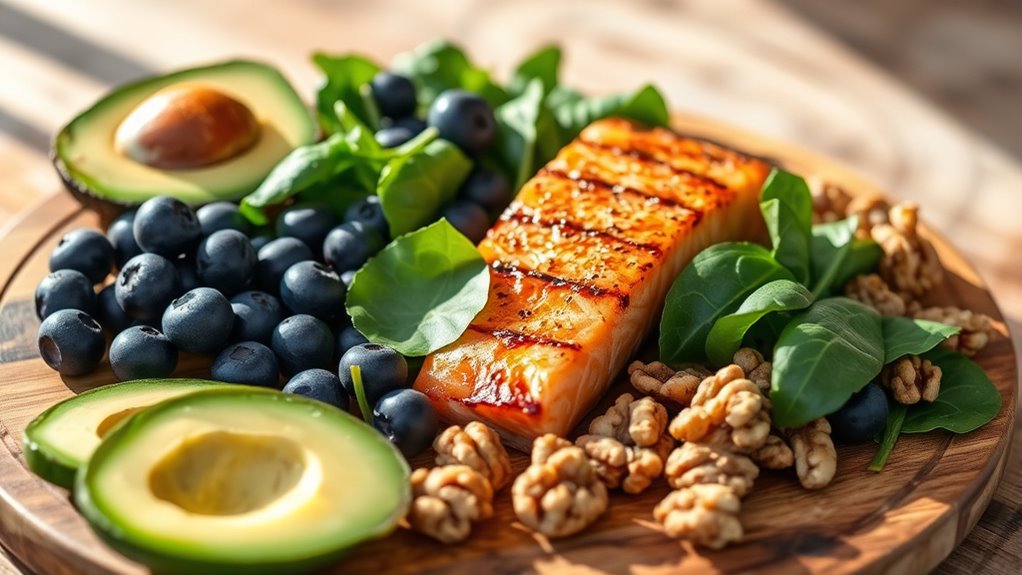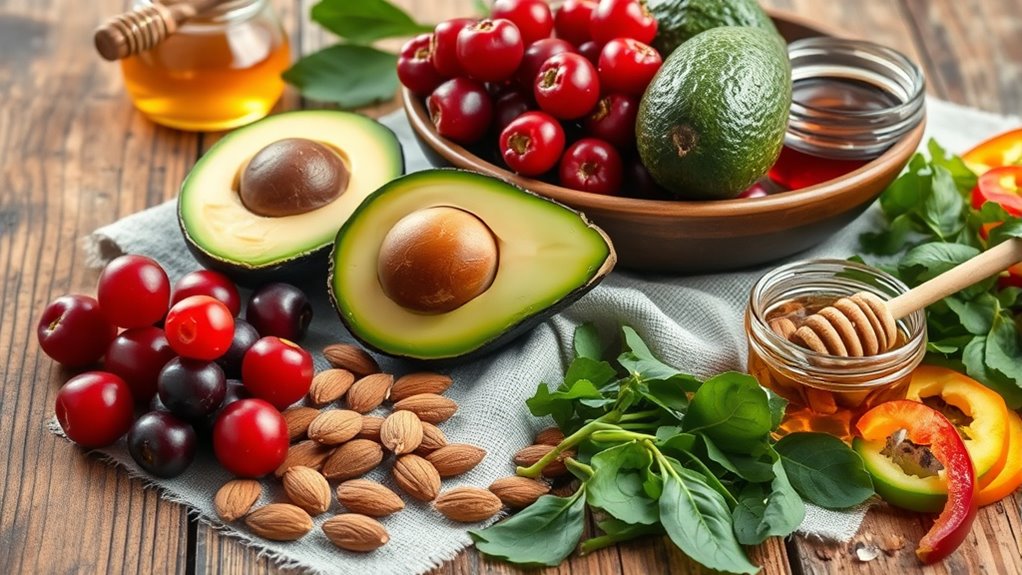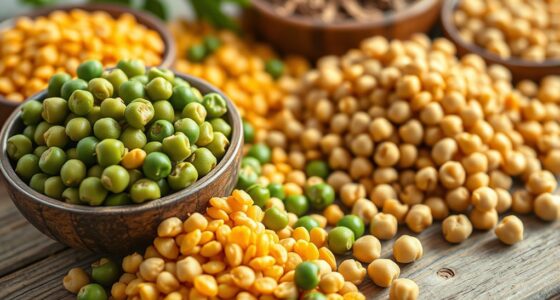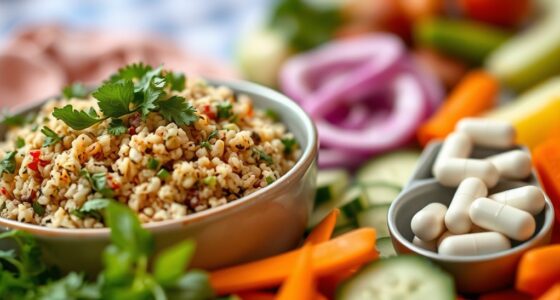To stabilize your blood sugar, focus on eating foods high in fiber like vegetables, whole grains, and legumes, which slow digestion. Include healthy fats and lean proteins, such as avocados, nuts, and chicken, to help release glucose gradually. Pair complex carbs with proteins or fats to prevent spikes. Avoid sugary snacks and refined carbs, which cause rapid increases. For more tips on choosing foods that keep your glucose steady, continue exploring how to optimize your meals.
Key Takeaways
- Incorporate high-fiber foods like vegetables, whole grains, and legumes to slow glucose absorption.
- Pair complex carbs with healthy fats and lean proteins to prevent rapid blood sugar spikes.
- Choose foods rich in soluble fiber, such as oats and apples, to promote steady glucose levels.
- Limit refined carbs and sugary foods that cause quick blood sugar surges.
- Include healthy fats like avocados, nuts, and olive oil to support gradual glucose release.

Have you ever wondered how maintaining steady blood sugar levels can impact your overall health? The key lies in understanding how meal timing and insulin response work together to keep your glucose stable. When you eat, your body responds by releasing insulin, a hormone that helps move sugar from your bloodstream into your cells for energy or storage. If you eat at irregular intervals or consume foods that cause rapid spikes, your insulin response becomes overwhelmed, leading to swings in blood sugar. Over time, this can contribute to insulin resistance and increase your risk for health issues like diabetes. To prevent this, paying attention to meal timing is vital. Spacing your meals evenly throughout the day helps your body maintain a predictable insulin response, avoiding sudden surges and dips in blood sugar levels. Consuming smaller, balanced meals every 3 to 4 hours can keep your energy steady and reduce cravings.
Choosing foods that promote a gradual release of glucose into your bloodstream is equally important. Foods rich in fiber, healthy fats, and lean proteins slow down digestion and absorption, resulting in a more controlled insulin response. For instance, pairing complex carbs like whole grains or legumes with proteins or healthy fats can blunt blood sugar spikes. This combination ensures your blood glucose stays within a healthy range longer after eating. On the other hand, refined carbs and sugary foods cause rapid increases in blood sugar, prompting your pancreas to flood your bloodstream with insulin. Over time, frequent high insulin responses can strain your pancreas and impair your body’s ability to regulate blood sugar effectively.
Frequently Asked Questions
Can Certain Foods Cause Blood Sugar Spikes Even if They Are Healthy?
Yes, certain healthy snacks and sugar substitutes can still cause blood sugar spikes. Even if you choose whole grains or fruits, portion sizes matter. Some sugar substitutes may trigger a response in your body, leading to higher glucose levels. To keep your blood sugar stable, opt for balanced meals, monitor your intake of healthy snacks, and choose sugar substitutes wisely, avoiding ones that might spike your blood sugar.
How Does Stress Affect Blood Sugar Levels and Food Choices?
Did you know that stress increases cortisol levels, which can raise your blood sugar by up to 50%? When you’re stressed, your body releases cortisol, triggering your liver to produce more glucose for energy. This impacts your food choices, often leading to cravings for sugary or high-carb foods. Practicing stress management techniques helps regulate cortisol effects, stabilizing blood sugar levels and supporting healthier eating habits.
Are There Specific Foods That Help Improve Insulin Sensitivity?
You can improve insulin sensitivity by boosting your fiber intake, which helps slow glucose absorption and reduces blood sugar spikes. Incorporate foods like oats, beans, and vegetables into your meals. Additionally, cinnamon benefits include enhancing insulin efficiency and lowering blood sugar levels naturally. Regularly including these foods in your diet supports better insulin response and overall blood sugar stability.
How Does Alcohol Consumption Impact Blood Sugar Stability?
Think of your liver as a busy highway, processing alcohol effects and glucose at the same time. When you drink, alcohol taxes your liver’s metabolism, diverting attention from maintaining stable blood sugar. This can cause blood sugar spikes or drops, making it harder to keep your levels steady. So, drinking excessively may hinder your body’s ability to regulate glucose effectively, impacting your overall blood sugar stability.
Can Timing of Meals Influence Blood Sugar Control Effectively?
Yes, meal timing can markedly influence your blood sugar control. Eating at regular intervals helps prevent spikes and crashes, especially when combined with fasting strategies like intermittent fasting. By planning your meals thoughtfully, you stabilize glucose levels and improve insulin sensitivity. Consistency in meal timing supports better energy levels and reduces cravings, making it easier to maintain balanced blood sugar throughout the day.
Conclusion
By choosing foods that stabilize your blood sugar, you’re like a skilled captain steering your ship through choppy waters to calmer seas. Remember, balancing your glucose isn’t a race but a steady journey. Keep your plate colorful and nourishing, and you’ll find your energy soaring instead of crashing. With mindful choices, you can keep your blood sugar in harmony, turning the chaos into a peaceful, steady rhythm that supports your health every day.









